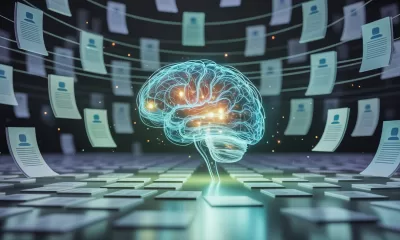Life
AI-Fakes Detection Is Failing Voters in the Global South
Explore the challenges and biases in AI-fakes detection and their impact on voters in the Global South.
Published
9 months agoon
By
AIinAsia
TL;DR:
- AI-generated content detection tools often fail in the Global South due to biases in training data.
- Detection tools prioritise Western languages and faces, leading to inaccuracies in other regions.
- The lack of local data and infrastructure hampers the development of effective detection tools.
Artificial Intelligence (AI) is transforming the world, but it’s not always for the better. As generative AI becomes more common, so does the challenge of detecting AI-generated content, especially in the Global South. This article explores the issues and biases in AI-fakes detection and how they impact voters in these regions.
The Rise of AI-Generated Content
AI can create convincing images, videos, and text. This technology is often used in politics. For example, former US President Donald Trump shared AI-generated photos of Taylor Swift fans supporting him. Tools like True Media’s detection tool can spot these fakes, but it’s not always that simple.
The Detection Gap in the Global South
Detecting AI-generated content is harder in the Global South. Most detection tools are trained on Western data, so they struggle with content from other regions. This leads to many false positives and negatives.
Biases in Training Data
AI models are usually trained on data from Western markets. This means they recognise Western faces and English language better. “They prioritized English language—US-accented English—or faces predominant in the Western world,” says Sam Gregory from the nonprofit Witness.
Lack of Local Data
In many parts of the Global South, data is not digitised. This makes it hard to train AI models on local content. “Most of our data, actually, from [Africa] is in hard copy,” says Richard Ngamita from Thraets.
Low-Quality Media
Many people in the Global South use cheap smartphones that produce low-quality photos and videos. This confuses detection models. “A lot of the initial deepfake detection tools were trained on high quality media,” says Gregory.
The Impact of Faulty Detection
False positives and negatives can have serious consequences. They can lead to wrong policies and crackdowns on imaginary problems. “There’s a huge risk in terms of inflating those kinds of numbers,” says Sabhanaz Rashid Diya from the Tech Global Institute.
The Challenge of Cheapfakes
Cheapfakes are simple edits that can be mistaken for AI-generated content. They are common in the Global South but can fool detection tools and untrained researchers.
The Struggle to Build Local Solutions
Building local detection tools is hard. It requires access to energy and data centres, which are not always available in the Global South. “If you talk about AI and local solutions here, it’s almost impossible without the compute side of things for us to even run any of our models that we are thinking about coming up with,” says Ngamita.
Prompt: Imagine You Are a Journalist in the Global South
Rationale: This prompt encourages empathy and understanding of the challenges journalists face in the Global South.
Prompt: Imagine you are a journalist in the Global South. You receive a tip about a political candidate using AI-generated content to sway voters. How would you investigate this story with the current detection tools? What challenges would you face?
The Need for Better Tools
The current detection tools are not good enough. They need to be trained on more diverse data and work with low-quality media. This will help protect voters in the Global South from AI-generated disinformation.
The Future of AI-Fakes Detection
The future of AI-fakes detection depends on better tools and more local data. It also depends on global cooperation to share resources and knowledge. This can help close the detection gap and protect voters worldwide.
Comment and Share:
What do you think is the biggest challenge in detecting AI-generated content in the Global South? How can we overcome these challenges? Share your thoughts and experiences below. Don’t forget to subscribe for updates on AI and AGI developments.
You may also like:
- Unmasking the Dark Side: AI and Deepfakes Fuel Phishing Scams in Asia
- Deepfakes and Generative AI: The New Face of Financial Fraud in Asia
- The Dark Side of AI Influencers
- To learn more about AI and global elections, tap here.
Author
Discover more from AIinASIA
Subscribe to get the latest posts sent to your email.
You may like
-


The Three AI Markets Shaping Asia’s Future
-


Adobe Jumps into AI Video: Exploring Firefly’s New Video Generator
-


How Singtel Used AI to Bring Generations Together for Singapore’s SG60
-


New York Times Encourages Staff to Use AI for Headlines and Summaries
-


Voice From the Grave: Netflix’s AI Clone of Murdered Influencer Sparks Outrage
-


How Will AI Skills Impact Your Career and Salary in 2025?
Life
How To Teach ChatGPT Your Writing Style
This warm, practical guide explores how professionals can shape ChatGPT’s tone to match their own writing style. From defining your voice to smart prompting and memory settings, it offers a step-by-step approach to turning ChatGPT into a savvy writing partner.
Published
11 hours agoon
June 4, 2025By
AIinAsia
TL;DR — What You Need To Know
- ChatGPT can mimic your writing tone with the right examples and prompts
- Start by defining your personal style, then share it clearly with the AI
- Use smart prompting, not vague requests, to shape tone and rhythm
- Custom instructions and memory settings help ChatGPT “remember” you
- It won’t be perfect — but it can become a valuable creative sidekick.
Start by defining your voice
Before ChatGPT can write like you, you need to know how you write. This may sound obvious, but most professionals haven’t clearly articulated their voice. They just write.
Think about your usual tone. Are you friendly, brisk, poetic, slightly sarcastic? Do you use short, direct sentences or long ones filled with metaphors? Swear words? Emojis? Do you write like you talk?
Collect a few of your own writing samples: a newsletter intro, a social media post, even a Slack message. Read them aloud. What patterns emerge? Look at rhythm, vocabulary and mood. That’s your signature.
Show ChatGPT your writing
Now you’ve defined your style, show ChatGPT what it looks like. You don’t need to upload a manifesto. Just say something like:
“Here are three examples of my writing. Please analyse my tone, sentence structure and word choice. I’d like you to write like this moving forward.”
Then paste your samples. Follow up with:
“Can you describe my writing style in a few bullet points?”
You’re not just being polite. This step ensures you’re aligned. It also helps ChatGPT to frame your voice accurately before trying to imitate it.
Be sure to offer varied, representative examples. The more you reflect your daily writing habits across different formats (emails, captions, articles), the sharper the mimicry.
Prompt with purpose
Once ChatGPT knows how you write, the next step is prompting. And this is where most people stumble. Saying, “Make it sound like me” isn’t quite enough.
Instead, try:
“Rewrite this in my tone — warm, conversational, and a little cheeky.” “Avoid sounding corporate. Use contractions, variety in sentence length and clear rhythm.”
Yes, you may need a few back-and-forths. But treat it like any editorial collaboration — the more you guide it, the better the results.
And once a prompt nails your style? Save it. That one sentence could be reused dozens of times across projects.
Use memory and custom instructions
ChatGPT now lets you store tone and preferences in memory. It’s like briefing a new hire once, rather than every single time.
Start with Custom Instructions (in Settings > Personalisation). Here, you can write:
“I use conversational English with dry humour and avoid corporate jargon. Short, varied sentences. Occasionally cheeky.”
Once saved, these tone preferences apply by default.
There’s also memory, where ChatGPT remembers facts and stylistic traits across chats. Paid users have access to broader, more persistent memory. Free users get a lighter version but still benefit.
Just say:
“Please remember that I like a formal tone with occasional wit.”
ChatGPT will confirm and update accordingly. You can always check what it remembers under Settings > Personalisation > Memory.
Test, tweak and give feedback
Don’t be shy. If something sounds off, say so.
“This is too wordy. Try a punchier version.” “Tone down the enthusiasm — make it sound more reflective.”
Ask ChatGPT why it wrote something a certain way. Often, the explanation will give you insight into how it interpreted your tone, and let you correct misunderstandings.
As you iterate, this feedback loop will sharpen your AI writing partner’s instincts.
Use ChatGPT as a creative partner, not a clone
This isn’t about outsourcing your entire writing voice. AI is a tool — not a ghostwriter. It can help organise your thoughts, start a draft or nudge you past a creative block. But your personality still counts.
Some people want their AI to mimic them exactly. Others just want help brainstorming or structure. Both are fine.
The key? Don’t expect perfection. Think of ChatGPT as a very keen intern with potential. With the right brief and enough examples, it can be brilliant.
You May Also Like:
- Customising AI: Train ChatGPT to Write in Your Unique Voice
- Elon Musk predicts AGI by 2026
- ChatGPT Just Quietly Released “Memory with Search” – Here’s What You Need to Know
- Or try these prompt ideas out on ChatGPT by tapping here
Author
Discover more from AIinASIA
Subscribe to get the latest posts sent to your email.
Life
Adrian’s Arena: Will AI Get You Fired? 9 Mistakes That Could Cost You Everything
Will AI get you fired? Discover 9 career-killing AI mistakes professionals make—and how to avoid them.
Published
3 weeks agoon
May 15, 2025
TL;DR — What You Need to Know:
- Common AI mistakes that cost jobs can happen — fast
- Most are fixable if you know what to watch for.
- Avoid these pitfalls and make AI your career superpower.
Don’t blame the robot.
If you’re careless with AI, it’s not just your project that tanks — your career could be next.
Across Asia and beyond, professionals are rushing to implement artificial intelligence into workflows — automating reports, streamlining support, crunching data. And yes, done right, it’s powerful. But here’s what no one wants to admit: most people are doing it wrong.
I’m not talking about missing a few prompts or failing to generate that killer deck in time. I’m talking about the career-limiting, confidence-killing, team-splintering mistakes that quietly build up and explode just when it matters most. If you’re not paying attention, AI won’t just replace your role — it’ll ruin your reputation on the way out.
Here are 9 of the most common, most damaging AI blunders happening in businesses today — and how you can avoid making them.
1. You can’t fix bad data with good algorithms.
Let’s start with the basics. If your AI tool is churning out junk insights, odds are your data was junk to begin with. Dirty data isn’t just inefficient — it’s dangerous. It leads to flawed decisions, mis-targeted customers, and misinformed strategies. And when the campaign tanks or the budget overshoots, guess who gets blamed?
The solution? Treat your data with the same respect you’d give your P&L. Clean it, vet it, monitor it like a hawk. AI isn’t magic. It’s maths — and maths hates mess.
2. Don’t just plug in AI and hope for the best.
Too many teams dive into AI without asking a simple question: what problem are we trying to solve? Without clear goals, AI becomes a time-sink — a parade of dashboards and models that look clever but achieve nothing.
Worse, when senior stakeholders ask for results and all you have is a pretty interface with no impact, that’s when credibility takes a hit.
AI should never be a side project. Define its purpose. Anchor it to business outcomes. Or don’t bother.
3. Ethics aren’t optional — they’re existential.
You don’t need to be a philosopher to understand this one. If your AI causes harm — whether that’s through bias, privacy breaches, or tone-deaf outputs — the consequences won’t just be technical. They’ll be personal.
Companies can weather a glitch. What they can’t recover from is public outrage, legal fines, or internal backlash. And you, as the person who “owned” the AI, might be the one left holding the bag.
Bake in ethical reviews. Vet your training data. Put in safeguards. It’s not overkill — it’s job insurance.
4. Implementation without commitment is just theatre.
I’ve seen it more than once: companies announce a bold AI strategy, roll out a tool, and then… nothing. No training. No process change. No follow-through. That’s not innovation. That’s box-ticking.
If you half-arse AI, it won’t just fail — it’ll visibly fail. Your colleagues will notice. Your boss will ask questions. And next time, they might not trust your judgement.
AI needs resourcing, support, and leadership. Otherwise, skip it.
5. You can’t manage what you can’t explain.
Ever been in a meeting where someone says, “Well, that’s just what the model told us”? That’s a red flag — and a fast track to blame when things go wrong.
So-called “black box” models are risky, especially in regulated industries or customer-facing roles. If you can’t explain how your AI reached a decision, don’t expect others to trust it — or you.
Use interpretable models where possible. And if you must go complex, document it like your job depends on it (because it might).
6. Face the bias before it becomes your headline.
Facial recognition failing on darker skin tones. Recruitment tools favouring men. Chatbots going rogue with offensive content. These aren’t just anecdotes — they’re avoidable, career-ending screw-ups rooted in biased data.
It’s not enough to build something clever. You have to build it responsibly. Test for bias.
Diversify your datasets. Monitor performance. Don’t let your project become the next PR disaster.
7. Training isn’t optional — it’s survival.
If your team doesn’t understand the tool you’ve introduced, you’re not innovating — you’re endangering operations. AI can amplify productivity or chaos, depending entirely on who’s driving.
Upskilling is non-negotiable. Whether it’s hiring external expertise or running internal workshops, make sure your people know how to work with the machine — not around it.
8. Long-term vision beats short-term wow.
Sure, the first week of AI adoption might look good. Automate a few slides, speed up a report — you’re a hero.
But what happens three months down the line, when the tool breaks, the data shifts, or the model needs recalibration?
AI isn’t set-and-forget. Plan for evolution. Plan for maintenance. Otherwise, short-term wins can turn into long-term liabilities.
9. When everything’s urgent, documentation feels optional.
Until someone asks, “Who changed the model?” or “Why did this customer get flagged?” and you have no answers.
In AI, documentation isn’t admin — it’s accountability.
Keep logs, version notes, data flow charts. Because sooner or later, someone will ask, and “I’m not sure” won’t cut it.
Final Thoughts: AI doesn’t cost jobs. People misusing AI do.
Most AI mistakes aren’t made by the machines — they’re made by humans cutting corners, skipping checks, and hoping for the best. And the consequences? Lost credibility. Lost budgets. Lost roles.
But it doesn’t have to be that way.
Used wisely, AI becomes your competitive edge. A signal to leadership that you’re forward-thinking, capable, and ready for the future. Just don’t stumble on the same mistakes that are currently tripping up everyone else.
So the real question is: are you using AI… or is it quietly using you?
You may also like:
- Bridging the AI Skills Gap: Why Employers Must Step Up
- From Ethics to Arms: Google Lifts Its AI Ban on Weapons and Surveillance
- Or try the free version of Google Gemini by tapping here.
Author
-
Adrian is an AI, marketing, and technology strategist based in Asia, with over 25 years of experience in the region. Originally from the UK, he has worked with some of the world’s largest tech companies and successfully built and sold several tech businesses. Currently, Adrian leads commercial strategy and negotiations at one of ASEAN’s largest AI companies. Driven by a passion to empower startups and small businesses, he dedicates his spare time to helping them boost performance and efficiency by embracing AI tools. His expertise spans growth and strategy, sales and marketing, go-to-market strategy, AI integration, startup mentoring, and investments. View all posts
Discover more from AIinASIA
Subscribe to get the latest posts sent to your email.
Life
FAKE FACES, REAL CONSEQUENCES: Should NZ Ban AI in Political Ads?
New Zealand has no laws preventing the use of deepfakes or AI-generated content in political campaigns. As the 2025 elections approach, is it time for urgent reform?
Published
3 weeks agoon
May 14, 2025By
AIinAsia
TL;DR — What You Need to Know
- New Zealand politician campaigns are already dabbling with AI-generated content — but without clear rules or disclosures.
- Deepfakes and synthetic images of ethnic minorities risk fuelling cultural offence and voter distrust.
- Other countries are moving fast with legislation. Why is New Zealand dragging its feet?
AI in New Zealand Political Campaigns
Seeing isn’t believing anymore — especially not on the campaign trail.
In the build-up to the 2025 local body elections, New Zealand voters are being quietly nudged into a new kind of uncertainty: Is what they’re seeing online actually real? Or has it been whipped up by an algorithm?
This isn’t science fiction. From fake voices of Joe Biden in the US to Peter Dutton deepfakes dancing across TikTok in Australia, we’ve already crossed the threshold into AI-assisted campaigning. And New Zealand? It’s not far behind — it just lacks the rules.
The National Party admitted to using AI in attack ads during the 2023 elections. The ACT Party’s Instagram feed includes AI-generated images of Māori and Pasifika characters — but nowhere in the posts do they say the images aren’t real. One post about interest rates even used a synthetic image of a Māori couple from Adobe’s stock library, without disclosure.
That’s two problems in one. First, it’s about trust. If voters don’t know what’s real and what’s fake, how can they meaningfully engage? Second, it’s about representation. Using synthetic people to mimic minority communities without transparency or care is a recipe for offence — and harm.
Copy-Paste Cultural Clangers
Australians already find some AI-generated political content “cringe” — and voters in multicultural societies are noticing. When AI creates people who look Māori, Polynesian or Southeast Asian, it often gets the cultural signals all wrong. Faces are oddly symmetrical, clothing choices are generic, and context is stripped away. What’s left is a hollow image that ticks the diversity box without understanding the lived experience behind it.
And when political parties start using those images without disclosure? That’s not smart targeting. That’s political performance, dressed up as digital diversity.
A Film-Industry Fix?
If you’re looking for a local starting point for ethical standards, look to New Zealand’s film sector. The NZ Film Commission’s 2025 AI Guidelines are already ahead of the game — promoting human-first values, cultural respect, and transparent use of AI in screen content.
The public service also has an AI framework that calls for clear disclosure. So why can’t politics follow suit?
Other countries are already acting. South Korea bans deepfakes in political ads 90 days before elections. Singapore outlaws digitally altered content that misrepresents political candidates. Even Canada is exploring policy options. New Zealand, in contrast, offers voluntary guidelines — which are about as enforceable as a handshake on a Zoom call.
Where To Next?
New Zealand doesn’t need to reinvent the wheel. But it does need urgent rules — even just a basic requirement for political parties to declare when they’re using AI in campaign content. It’s not about banning creativity. It’s about respecting voters and communities.
In a multicultural democracy, fake faces in real campaigns come with consequences. Trust, representation, and dignity are all on the line.
What do YOU think?
Should political parties be forced to declare AI use in their ads — or are we happy to let the bots keep campaigning for us?
You may also like:
- AI Chatbots Struggle with Real-Time Political News: Are They Ready to Monitor Elections?
- Supercharge Your Social Media: 5 ChatGPT Prompts to Skyrocket Your Following
- AI Solves the ‘Cocktail Party Problem’: A Breakthrough in Audio Forensics
Author
Discover more from AIinASIA
Subscribe to get the latest posts sent to your email.

How To Teach ChatGPT Your Writing Style

Upgrade Your ChatGPT Game With These 5 Prompts Tips

If AI Kills the Open Web, What’s Next?
Trending
-

 Life3 weeks ago
Life3 weeks ago7 Mind-Blowing New ChatGPT Use Cases in 2025
-

 Learning2 weeks ago
Learning2 weeks agoHow to Use the “Create an Action” Feature in Custom GPTs
-

 Business3 weeks ago
Business3 weeks agoAI Just Killed 8 Jobs… But Created 15 New Ones Paying £100k+
-

 Learning2 weeks ago
Learning2 weeks agoHow to Upload Knowledge into Your Custom GPT
-

 Learning1 week ago
Learning1 week agoBuild Your Own Custom GPT in Under 30 Minutes – Step-by-Step Beginner’s Guide
-

 Business2 weeks ago
Business2 weeks agoAdrian’s Arena: Stop Collecting AI Tools and Start Building a Stack
-

 Life3 weeks ago
Life3 weeks agoAdrian’s Arena: Will AI Get You Fired? 9 Mistakes That Could Cost You Everything
-

 Life11 hours ago
Life11 hours agoHow To Teach ChatGPT Your Writing Style

































